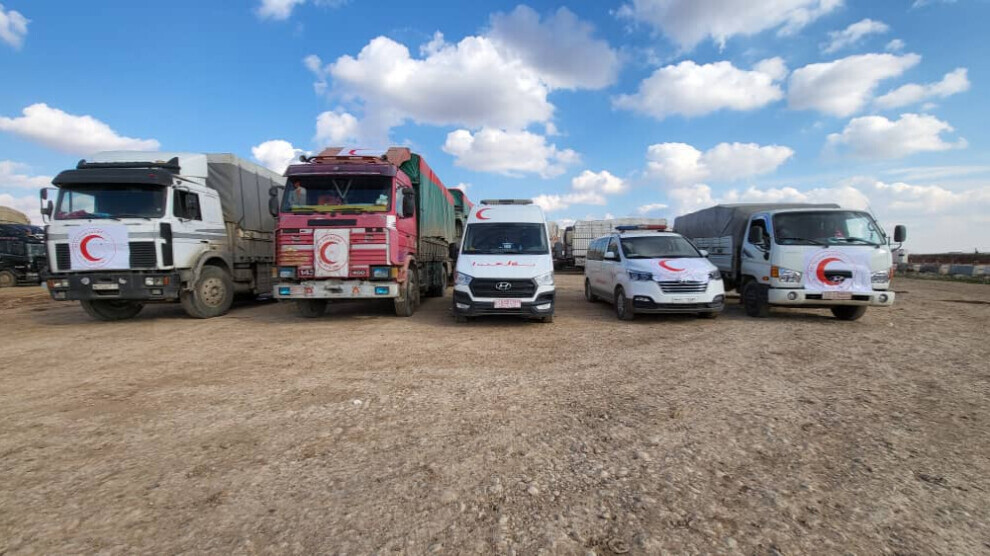The aid convoy of the Kurdish Red Crescent (Heyva Sor a Kurd) is still stuck at the informal border between the north-eastern Syrian autonomous zone and the regime area. The government in Damascus continues to deny the aid organisation access to the Syrian earthquake zone, although numerous people are waiting for help. Initially, half of the goods and at least one ambulance had to be handed over to the regime as a condition for continuing the journey, but Damascus is now demanding that the entire convoy be handed over to the Syrian Arab Red Crescent (SARC). "This is unacceptable to us," said Fee Baumann, who coordinates Heyva Sor a Kurd's aid convoy. "We know how closely SARC works with the regime, and we also know that our aid will very likely not get where it needs to go if we hand it over."
Baumann has been trying to get a permit for the aid transport since Saturday. The Kurdish Red Crescent convoy consists of two medical ambulances and several trucks with relief supplies such as tents, blankets, medicine, food, baby food and water. The team also includes medical personnel, including doctors and paramedics. The destination is the city of Aleppo and the Kurdish districts of Sheikh Maqsoud (Şêxmeqsûd) and Ashrafiyah (Eşrefiyê) to the north of the metropolis, as well as the neighbouring canton of Shehba. But for the third day in a row, nothing is progressing. In the earthquake region with numerous untreated injured people, however, it is important to get help quickly, said Baumann.
"It is inconceivable that the regime is exploiting political differences even in this situation," Baumann said. "Countless people are waiting for help, many are still lying under the rubble of their houses, and it is bitterly cold. Add to that the danger of epidemics, which grows with every passing moment a week after the devastating earthquakes." The aid worker is frustrated, but also angry. "We are standing here with a team that can help, but we are not let through. The regime and SARC are investing time and energy in dealing with a small aid transport instead of gratefully accepting the help. This shocks even us, although we already know the corruptness of the Syrian government's system."
DOCTORS WITHOUT BORDERS CONVOY REACHES DISASTER AREA
An aid convoy from the Doctors Without Borders was able to travel to the north-western Syrian disaster area on Monday. According to the Autonomous Administration of North and East Syria (AANES), a corresponding permit was granted after arduous and tough negotiations with the Turkish-Jihadist occupying power. According to Ciwan Mela Ibrahim, press spokesperson of the autonomous administration, the convoy consists of 32 vehicles with relief and medical supplies. Since last week, aid workers have been holding out near Manbij to bring aid into the occupied zone. The column's destination is not only Idlib but also Afrin.
TRUCKS WITH DIESEL ARE NOT ALLOWED TO PASS THROUGH EITHER
Dozens of AANES trucks, loaded mainly with diesel for heating and for fueling the clearance vehicles, as well as medicine and food, are still at the same point where the Kurdish Red Crescent is waiting for a transit permit. According to Fee Baumann, however, it is not only due to the Syrian regime that the emergency aid cannot reach the disaster area. "Turkey is putting pressure on Damascus not to let aid through from north-eastern Syria. Admittedly, we have always had problems getting aid supplies here. But we hoped that, given the situation, political differences would no longer matter." In the meantime, they have been taught otherwise.
DEATH TOLL RISES TO MORE THAN 37,500
One week after the devastating earthquake in the Syrian-Turkish border region, the death toll has risen to more than 37,500. In Turkey alone, 31,643 people died and more than 80,000 people were injured, reported AFAD (Disaster and Emergency Management Presidency) on Monday. According to the World Health Organisation (WHO), the number of victims in Syria is at least 5,900. Thousands of people are still missing. The UN fears far higher numbers. There is little hope of finding survivors under the rubble.















